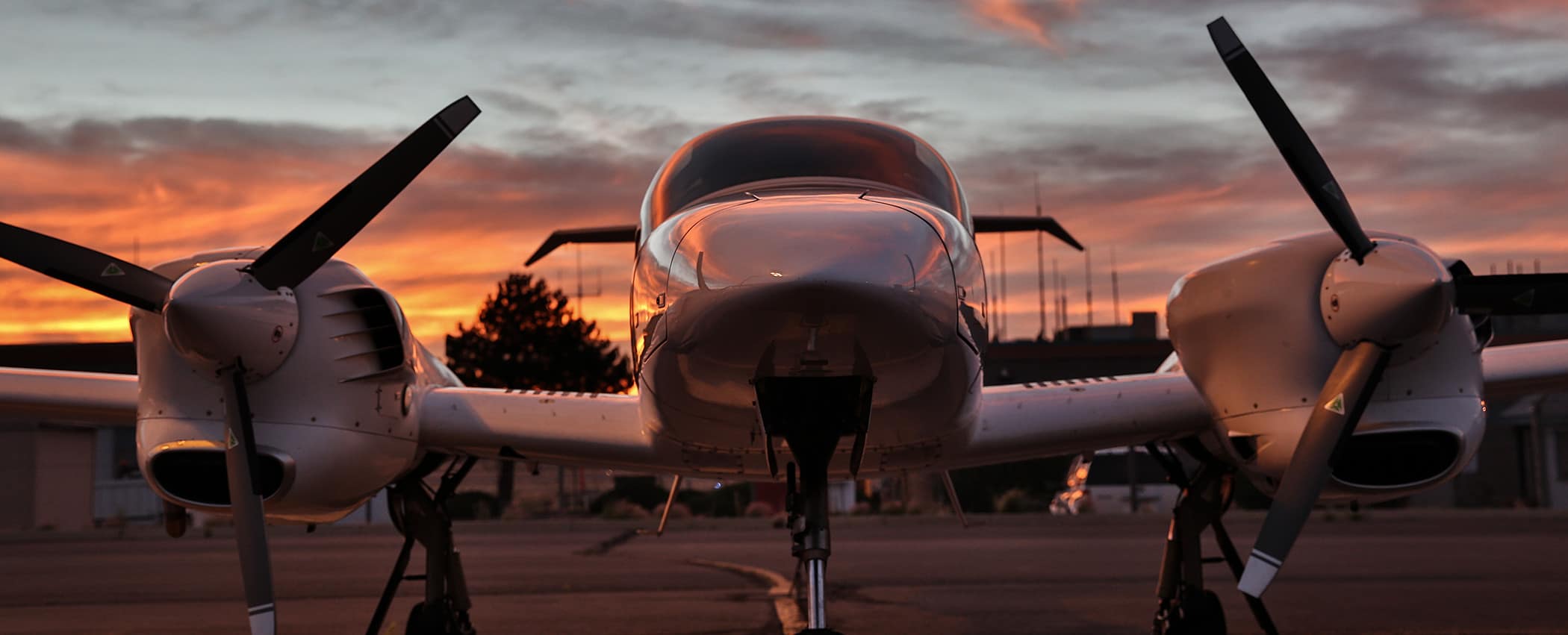
Bachelor of Science in
Air Traffic Management
The B.S. in Air Traffic Management prepares students for entry-level controller positions at an FAA-designated Collegiate Training Initiative School.
About the Bachelor of Science in Air Traffic Management
The Bachelor of Science in Air Traffic Management at Embry‑Riddle prepares graduates for a thrilling career in air traffic control. One of just a small number of universities granted Federal Aviation Administration (FAA) designation as a Collegiate Training Initiative School, Embry‑Riddle’s air traffic control program is taught by passionate, knowledgeable professors who have held positions as air traffic controllers themselves.
The air traffic controller degree equips you with the essential knowledge and foundation required to enter the FAA Academy. Through a formal partnership agreement with the FAA, Embry‑Riddle consistently meets and exceeds FAA demands and standards. Our graduates consistently excel at the FAA Academy each year, a testament to the high quality of education and experience they receive at Embry‑Riddle.
Student Learning Outcomes
What you will learn while studying in the air traffic controller program:
- Comprehend Air Traffic Control operations pertinent to aircraft
- Ability to understand radar separation of aircraft
- Interpret Instrument Approach Procedure (IAP), Departure Procedure (DP) and Standard Arrival Route (STAR) Charts
- Skills in radar separation procedures, airspace protection, speed adjustments and vectoring techniques
- Knowledge of basic VFR Control Tower operations, including duties and responsibilities
Air Traffic Management Career Opportunities
Careers and Employers
Embry‑Riddle graduates tend to secure roles as pilot operators, air traffic controllers, flight dispatchers and ground controllers, with a placement rate of 100% within a year of graduation.
Students in the air traffic controller program often enter the industry through top companies such as:
- Raytheon
- Federal Aviation Administration
- The Boeing Company
- Lockheed Martin
- SAIC (Science Application International Corporation)
Air Traffic Management Salary Information
Air Traffic Controllers are some of the highest paid government employees, with the U.S. Bureau of Labor Statistics reporting a median annual salary of $129,750.
DETAILS
About Air Traffic Management at the Prescott, AZ Campus
The Bachelor of Science in Air Traffic Management is housed in the Department of Aeronautical Science in the College of Aviation. In addition to Air Traffic Management courses, the curriculum is designed to provide exposure to procedures and operations consistent with those found in FAA air traffic control facilities.
Prescott students attend classes that incorporate computer-based simulation training in all areas of air traffic control, even unmanned aircraft. The campus maintains a modern fleet of aircraft and a host of advanced flight simulation devices with advanced visual systems.
Air Traffic Management Information
- Credits: 120
- Online or In-Person: In-Person
Helpful Links
- Tour our Prescott campus
- Discover the Department's Faculty
- Explore the Fields of Study: Applied Science & Aviation
- Find Related Clubs & Organizations
Student Learning Outcomes
Students will:
- Conduct operations in the en route air traffic control environment related to non-radar separation and procedures.
- Conduct operations using high-fidelity simulation in the en route air traffic control environment related to radar separation and procedures.
- Recall information on the basics of air traffic control, including its history, mission, and duty priority.
- Conduct operations using high-fidelity simulation in the airport terminal environment related to VFR Control Tower operations.
- Conduct operations using high-fidelity simulation in a low volume terminal radar environment related to radar separation and procedures.
- Conduct operations using high-fidelity simulation in a high volume, complex terminal radar environment related to radar separation and procedures.
- Apply accepted practices in air traffic management to analyze a cumulative knowledge of collaborative air traffic management, traffic flow management, and advanced air traffic management procedures.
Degree Requirements
The Bachelor of Science degree in Air Traffic Management requires successful completion of a minimum of 122 semester hours, normally completed in eight semesters. A minimum of 40 semester hours must be upper-level.
Students must select and complete one minor field of study, as approved by the Applied Aviation Sciences Department. Total credits within the minor will vary depending on which minor is chosen. Students typically select a minor that will enhance their aviation career.
Students should be aware that several courses in each academic year might have prerequisites and/or corequisites. Please check the course descriptions in this catalog before registering for classes to ensure requisite sequencing.
Program Requirements
General Education
Embry‑Riddle degree programs require students to complete a minimum of 36 hours of General Education coursework. For a full description of Embry‑Riddle General Education guidelines, please see the General Education section of this catalog.
Students may choose other classes outside of their requirements, but doing so can result in the student having to complete more than the degree's 120 credit hours. This will result in additional time and cost to the student.
| Communication Theory and Skills | 9 | |
| Computer Science/Information Technology | 3 | |
| Mathematics | 6 | |
| Physical and Life Sciences (Natural Sciences) | 6 | |
| Humanities and Social Sciences | 12 | |
3 hours of Lower-Level Humanities | ||
3 hours of Lower-Level Social Science | ||
3 hours of Lower-Level or Upper-Level Humanities or Social Science | ||
3 hours of Upper-Level Humanities or Social Science | ||
| Total Credits | 36 | |
Air Traffic Management Core (107 Credits)
The following course of study outlines the quickest and most cost-efficient route for students to earn their B.S. in Air Traffic Management. Students are encouraged to follow the course of study to ensure they complete all program required courses and their prerequisites within four years.
Courses in the core with a # will satisfy general education requirements.
| Accounting, Business Administration, or Economics Upper-Level Elective | 3 | |
| AS 121 | Private Pilot Operations | 5 |
| AS 125 | Private and UAS Pilot Operations | 3 |
| AS 207 | Introduction to Aviation Research Methods | 3 |
| AS 221 | Instrument Pilot Operations | 3 |
| AS 221L | Instrument Pilot Operations Laboratory | 1 |
| AS 309 | Aerodynamics | 3 |
| AS 310 | Aircraft Performance | 3 |
| AS 350 | Domestic and International Navigation | 3 |
| AS 359 | Aviation Stress Management | 3 |
| AS 405 | Aviation Law | 3 |
| AS 410 | Airline Dispatch Operations | 3 |
| AS 480 | Applied Aviation Research Methods | 3 |
| AT 202 | Introduction to Air Traffic Management | 3 |
| AT 305 | Introduction to Terminal Radar Operations | 3 |
| AT 315 | Introduction to Air Traffic Control Tower | 3 |
| AT 401 | Advanced Terminal Radar Operations | 3 |
| AT 405 | Advanced En Route Operations | 3 |
| AT 415 | Advanced Air Traffic Control Tower | 3 |
| BA 201 | Principles of Management | 3 |
| COM 122 | English Composition # | 3 |
| General Education - Communication Theory and Skills Elective # | 6 | |
| General Education - Computer Science/Information Technology Elective # | 3 | |
| General Education - Humanities Lower-Level Elective # | 3 | |
| General Education - Social Science Lower-Level Elective # | 3 | |
| General Education - Humanities or Social Science Lower-Level Elective # | 3 | |
| General Education - Humanities or Social Science Upper-Level Elective # | 3 | |
| General Education - Natural Science Elective # | 3 | |
| GEO 210 | Introduction to Geographic Information Systems | 3 |
| MA 111 | Pre-Calculus for Aviation # | 3 |
| MA 112 | Applied Calculus for Aviation # | 3 |
| SF 210 | Introduction to Aerospace Safety | 3 |
| WX 201 | Survey of Meteorology # | 3 |
| WX 203L | Survey of Meteorology Laboratory # | 1 |
| WX 301 | Aviation Weather | 3 |
| UNIV 101 | College Success | 1 |
| Total Credits | 107 | |
Minor Requirement (15 Credits)
| Minor * | 15 | |
| Total Credits | 122 | |
- *
Students must complete at least one minor.
- #
General Education Course
Air traffic controllers are required to possess a current FAA 2nd Class or higher medical certificate to receive and exercise the privileges of their FAA Air Traffic Controller certificates. Students should verify their eligibility status for this level medical certificate with an FAA designated medical examiner prior to enrolling in this degree program. The medical certificate is not required for ATM courses or degree enrollment.
Prospective air traffic controllers must be able to complete their university education and have entered the FAA Air Traffic Control Academy prior to reaching their 31st birthday.
FAA air traffic controllers must be U.S. citizens.
All Army ROTC students are required to complete SS 321 - U.S. Military History 1900-Present (3 credits) in order to commission.
Suggested Plan of Study
| Freshman Year | ||
|---|---|---|
| Fall | Credits | |
| AS 121 | Private Pilot Operations | 5 |
| COM 122 | English Composition | 3 |
| Computer Science/Information Technology Elective | 3 | |
| MA 111 | Pre-Calculus for Aviation | 3 |
| UNIV 101 | College Success | 1 |
| Credits Subtotal | 15.0 | |
| Spring | ||
| AS 125 | Private and UAS Pilot Operations | 3 |
| AT 202 | Introduction to Air Traffic Management | 3 |
| GEO 210 | Introduction to Geographic Information Systems | 3 |
| MA 112 | Applied Calculus for Aviation | 3 |
| Natural Science Elective | 3 | |
| Credits Subtotal | 15.0 | |
| Sophomore Year | ||
| Fall | ||
| AS 221 | Instrument Pilot Operations | 3 |
| AS 221L | Instrument Pilot Operations Laboratory | 1 |
| AT 305 | Introduction to Terminal Radar Operations | 3 |
| BA 201 | Principles of Management | 3 |
| Communications Elective | 3 | |
| Social Science Lower-Level Elective | 3 | |
| Credits Subtotal | 16.0 | |
| Spring | ||
| AS 309 | Aerodynamics | 3 |
| AT 315 | Introduction to Air Traffic Control Tower | 3 |
| Communications Elective | 3 | |
| SF 210 | Introduction to Aerospace Safety | 3 |
| WX 201 | Survey of Meteorology | 3 |
| WX 203L | Survey of Meteorology Laboratory | 1 |
| Credits Subtotal | 16.0 | |
| Junior Year | ||
| Fall | ||
| AS 207 | Introduction to Aviation Research Methods | 3 |
| AS 310 | Aircraft Performance | 3 |
| AS 350 | Domestic and International Navigation | 3 |
| AT 401 | Advanced Terminal Radar Operations | 3 |
| Minor/Open Elective | 3 | |
| Credits Subtotal | 15.0 | |
| Spring | ||
| Accounting, Business Administration, or Economics Upper-Level Elective | 3 | |
| AT 405 | Advanced En Route Operations | 3 |
| Humanities or Social Science Upper-Level Elective | 3 | |
| Minor/Open Elective | 3 | |
| WX 301 | Aviation Weather | 3 |
| Credits Subtotal | 15.0 | |
| Senior Year | ||
| Fall | ||
| AT 415 | Advanced Air Traffic Control Tower | 3 |
| AS 359 | Aviation Stress Management | 3 |
| AS 410 | Airline Dispatch Operations | 3 |
| Minor/Open Electives | 6 | |
| Credits Subtotal | 15.0 | |
| Spring | ||
| AS 405 | Aviation Law | 3 |
| AS 480 | Applied Aviation Research Methods | 3 |
| Humanities Lower-Level Elective | 3 | |
| Humanities or Social Science Lower-Level Elective | 3 | |
| Minor/Open Elective | 3 | |
| Credits Subtotal | 15.0 | |
| Credits Total: | 122.0 | |
Get Started Now:
Summary
120 Credits
Estimate your tuition by using the Tuition Calculator
View Financial Aid Information
Learn about our General Education
Find out about transferring credits to this degree
Learn more about our Veterans & Military benefits
View our Academic Calendar




